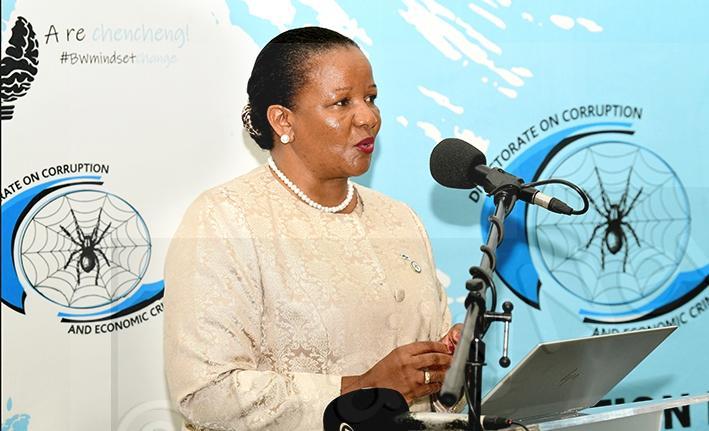Africa-Press – Botswana. Botswana is determined to regain its status as the least corrupt country in Africa.
According to the Transparency International’s latest Corruption Perception Index (CPI), Botswana is ranked 57 out of 100 countries in 2024, a decline from its previous ranking of 59 out of 100 in 2023. In the broader context, Botswana now sits at 43 out of 180 countries assessed in the index.
The Directorate on Corruption and Economic Crime (DCEC) director general, Ms Botlhale Makgekgenene said during a meet-and-greet session with the media in Francistown yesterday that Botswana’s CPI ranking was shaped by numerous indicators such as accountability of the executive, the regulation of party funding, the effectiveness of the judiciary, and the availability of information to both the media and the general public.
Of particular concern, she highlighted the influence of the Institute of Management index on Botswana’s drop in the ranking. She explained that the index assessed issues of governance, public administration and the ethical standards of institutions, all of which impacted the country’s perceived corruption levels.
Furthermore, she stressed the necessity of a collaborative partnership with the media, which she viewed as a critical partner in the fight against corruption and its associated challenges. She further underscored the media’s essential contribution to the DCEC’s investigative work, noting that many breakthroughs in various corruption cases had emerged from reports generated through multiple media channels, especially social media.
“The DCEC treats these media reports not just as alerts, but as crucial leads that can guide our investigations,” she stated, appreciating that the collaborative approach allowed the media to spotlight pertinent issues, enabling the DCEC to follow up and reinforce accountability for law violations.
Ms Makgekgenene expressed concern about the insufficiency of media coverage regarding the factors contributing to the CPI, urging journalists to recognise their significant role in portraying a comprehensive view of Botswana’s declining corruption perception.
In terms of the recent statistics, the DCEC, she said received a total of 687 reports alleging corruption and economic crimes in 2024 citing that out of total, 238 reports relating to 34 per cent were classified for further investigation, with 221 cases related to corruption, seven focused on economic crimes and 10 on money laundering.
Acknowledging the presence of corruption within State-Owned Enterprises, Ms Makgekgenene confirmed that the DCEC was conducting investigations to address issues at hand. The progress of such investigations, she said varied with some advancing while others remained in preliminary stages, often due to regulatory non-compliance and poor procurement practices.
Beyond investigating, Ms Makgekgenene said the DCEC was also working on implementing corrective measures aimed at bolstering governance, curbing corruption, and ensuring that procurement processes were transparent and competitive.
For his part, DCEC acting deputy director of prosecution, Mr Thabo Malambani, revealed that Francistown had emerged as a hotspot for corruption cases due to its diverse demographics. He said addressing corruption was complex and time-consuming, compounded by challenges such as limited human resources and inadequate transportation.
However, Mr Malambani reassured the public about the protections offered to whistleblowers under the DCEC Act, urging them to come forth to report suspicious corruption practices, knowing that there were safeguards in place for their safety.
For More News And Analysis About Botswana Follow Africa-Press






